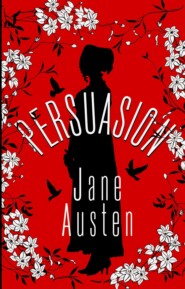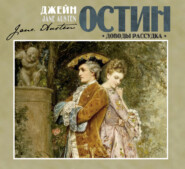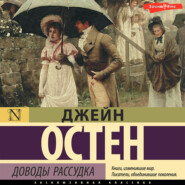По всем вопросам обращайтесь на: info@litportal.ru
(©) 2003-2025.
✖
Pride and Prejudice / Гордость и предубеждение
Настройки чтения
Размер шрифта
Высота строк
Поля
“Indeed, sir, I have not the least intention of dancing.”
Mr. Darcy requested to be allowed the honour of her hand, but in vain. Elizabeth was determined.
“You dance so well, Miss Eliza, that it is cruel to deny me the happiness of seeing you.”
“Mr. Darcy is all politeness,” said Elizabeth, smiling. She looked archly, and turned away.
Chapter 7
Mr. Bennet’s property consisted almost entirely in an estate of two thousand a year, which, unfortunately for his daughters, was entailed, in default of heirs male, on a distant relation.
The village of Longbourn was only one mile from Meryton; a most convenient distance for the young ladies, who were usually going three or four times a week, to pay their duty to their aunt. The two youngest of the family, Catherine and Lydia, went there very often. Meryton was the headquarters for the officers.
Young sisters could talk of nothing but officers; and Mr. Bingley’s large fortune was worthless in their eyes when opposed to the officer’s coat.
After listening one morning to their talking, Mr. Bennet observed:
“You must be two of the silliest girls in the country. I have suspected it some time, but I am now convinced.”
Catherine was disconcerted, and made no answer; but Lydia, with perfect indifference, continued to express her admiration of Captain Carter, who was going the next morning to London.
“My dear Mrs. Bennet, you must not expect such girls to have the sense of their father and mother,” said Mr. Bennet.
“When they get to our age, I dare say they will not think about officers any more. I remember the time when I liked a red coat myself very well – and, indeed, if a smart young colonel, with five or six thousand a year, should want one of my girls I shall not say “no” to him.”
Suddenly a letter for Miss Bennet arrived; it came from Netherfield, and the servant waited for an answer. Mrs. Bennet’s eyes sparkled with pleasure,
“Well, Jane, who is it from? What is it about? What does he say? Well, Jane, make haste and tell us; make haste, my love.”
“It is from Miss Bingley,” said Jane, and then read it aloud.
“MY DEAR FRIEND, -
“If you are not so kind to dine today with Louisa and me, we will hate each other, because a whole day between two women can never end without a quarrel. Come as soon as you can. My brother and the gentlemen will dine with the officers.
Yours,
“Caroline Bingley”
“With the officers!” cried Lydia.
“Dining out,” said Mrs. Bennet, “that is very unlucky.”
“Can I have the carriage?” said Jane.
“No, my dear, you had better go on horseback, because it seems likely to rain; and then you must stay all night.”
So Jane was therefore obliged to go on horseback, and her mother attended her to the door. Soon it rained hard. Her sisters were worried about her, but her mother was delighted. The rain continued the whole evening; Jane certainly could not come back.
“This was a lucky idea of mine, indeed!” said Mrs. Bennet. But the next morning a servant from Netherfield brought the following note for Elizabeth:
“My dearest Lizzy, -
“I find myself very unwell this morning, which, I suppose, is due to my getting wet through yesterday. My kind friends invited me to stay here. The doctor will come in a while, so do not worry. I have a sore throat and headache.
– Your Jane.”
“Well, my dear,” said Mr. Bennet, when Elizabeth had read the note aloud, “if your daughter should die, it would be a comfort to know that it was all in pursuit of Mr. Bingley.”
“Oh! I am not afraid, people do not die of colds. She will be taken good care of. As long as she stays there, it is all very well. I would go and see her if I could have the carriage.”
Elizabeth decided to go to her, but she could not ride the horse, so she decided to walk. She declared her resolution.
“How can you be so silly,” cried her mother, “in all this dirt!”
“But I shall see Jane – that is all I want. The distance is nothing when one has a motive; only three miles. I shall be back by dinner.”
Elizabeth’s appearance made a great surprise. She was walking three miles so early, in such dirty weather. It was incredible to everybody. She was received, however, very politely by them; and in their brother’s manners there was something better than politeness; there was good humour and kindness. Mr. Darcy said very little, he was thinking of her beauty.
Miss Bennet was not well enough to leave her room. Elizabeth was glad to see her immediately.
When breakfast was over Mr. Bingley’s sisters came; and Elizabeth began to like them, when she saw how much affection they showed for Jane. The doctor came, and examined his patient. He said that she had caught a violent cold; advised her to return to bed. The advice was followed readily. Elizabeth did not quit her room for a moment.
Chapter 8
At five o’clock the two ladies retired to dress, and at half-past six Elizabeth was called to dinner.
Jane was not better. The sisters, on hearing this, repeated three or four times how much they were grieved, how shocking it was to have a bad cold, and how they disliked being ill themselves.
When dinner was over, she returned directly to Jane, and Miss Bingley began to abuse Elizabeth as soon as she was out of the room. Her manners were considered very bad indeed, a mixture of pride and impertinence; she had no conversation, no style, no beauty.
“She has nothing, in short, to recommend her. Of course, she is an excellent walker. I shall never forget her appearance this morning.”
“Why did she come here, because her sister had a cold? Her hair, so untidy!”
“I thought Miss Elizabeth Bennet looked remarkably well, Louisa,” said Bingley; “when she came into the room this morning.”
“To walk three miles, or four miles, or five miles, above her ankles in dirt, and alone, quite alone! What could she mean by it?”
A short pause followed this speech, and the sisters began again:
“I like Miss Jane Bennet very much, she is really a very sweet girl. But with such a father and mother, and such low connections, I am afraid there is no chance for her in the life.”
To this speech Bingley made no answer.
Jane was still very poorly, and Elizabeth would not quit her at all, till late in the evening. On entering the drawing-room she found the whole party playing cards, and was immediately invited to join them. But she declined it, and said she would read a book instead.
“Do you prefer reading to cards? That is very strange.”
Mr. Darcy requested to be allowed the honour of her hand, but in vain. Elizabeth was determined.
“You dance so well, Miss Eliza, that it is cruel to deny me the happiness of seeing you.”
“Mr. Darcy is all politeness,” said Elizabeth, smiling. She looked archly, and turned away.
Chapter 7
Mr. Bennet’s property consisted almost entirely in an estate of two thousand a year, which, unfortunately for his daughters, was entailed, in default of heirs male, on a distant relation.
The village of Longbourn was only one mile from Meryton; a most convenient distance for the young ladies, who were usually going three or four times a week, to pay their duty to their aunt. The two youngest of the family, Catherine and Lydia, went there very often. Meryton was the headquarters for the officers.
Young sisters could talk of nothing but officers; and Mr. Bingley’s large fortune was worthless in their eyes when opposed to the officer’s coat.
After listening one morning to their talking, Mr. Bennet observed:
“You must be two of the silliest girls in the country. I have suspected it some time, but I am now convinced.”
Catherine was disconcerted, and made no answer; but Lydia, with perfect indifference, continued to express her admiration of Captain Carter, who was going the next morning to London.
“My dear Mrs. Bennet, you must not expect such girls to have the sense of their father and mother,” said Mr. Bennet.
“When they get to our age, I dare say they will not think about officers any more. I remember the time when I liked a red coat myself very well – and, indeed, if a smart young colonel, with five or six thousand a year, should want one of my girls I shall not say “no” to him.”
Suddenly a letter for Miss Bennet arrived; it came from Netherfield, and the servant waited for an answer. Mrs. Bennet’s eyes sparkled with pleasure,
“Well, Jane, who is it from? What is it about? What does he say? Well, Jane, make haste and tell us; make haste, my love.”
“It is from Miss Bingley,” said Jane, and then read it aloud.
“MY DEAR FRIEND, -
“If you are not so kind to dine today with Louisa and me, we will hate each other, because a whole day between two women can never end without a quarrel. Come as soon as you can. My brother and the gentlemen will dine with the officers.
Yours,
“Caroline Bingley”
“With the officers!” cried Lydia.
“Dining out,” said Mrs. Bennet, “that is very unlucky.”
“Can I have the carriage?” said Jane.
“No, my dear, you had better go on horseback, because it seems likely to rain; and then you must stay all night.”
So Jane was therefore obliged to go on horseback, and her mother attended her to the door. Soon it rained hard. Her sisters were worried about her, but her mother was delighted. The rain continued the whole evening; Jane certainly could not come back.
“This was a lucky idea of mine, indeed!” said Mrs. Bennet. But the next morning a servant from Netherfield brought the following note for Elizabeth:
“My dearest Lizzy, -
“I find myself very unwell this morning, which, I suppose, is due to my getting wet through yesterday. My kind friends invited me to stay here. The doctor will come in a while, so do not worry. I have a sore throat and headache.
– Your Jane.”
“Well, my dear,” said Mr. Bennet, when Elizabeth had read the note aloud, “if your daughter should die, it would be a comfort to know that it was all in pursuit of Mr. Bingley.”
“Oh! I am not afraid, people do not die of colds. She will be taken good care of. As long as she stays there, it is all very well. I would go and see her if I could have the carriage.”
Elizabeth decided to go to her, but she could not ride the horse, so she decided to walk. She declared her resolution.
“How can you be so silly,” cried her mother, “in all this dirt!”
“But I shall see Jane – that is all I want. The distance is nothing when one has a motive; only three miles. I shall be back by dinner.”
Elizabeth’s appearance made a great surprise. She was walking three miles so early, in such dirty weather. It was incredible to everybody. She was received, however, very politely by them; and in their brother’s manners there was something better than politeness; there was good humour and kindness. Mr. Darcy said very little, he was thinking of her beauty.
Miss Bennet was not well enough to leave her room. Elizabeth was glad to see her immediately.
When breakfast was over Mr. Bingley’s sisters came; and Elizabeth began to like them, when she saw how much affection they showed for Jane. The doctor came, and examined his patient. He said that she had caught a violent cold; advised her to return to bed. The advice was followed readily. Elizabeth did not quit her room for a moment.
Chapter 8
At five o’clock the two ladies retired to dress, and at half-past six Elizabeth was called to dinner.
Jane was not better. The sisters, on hearing this, repeated three or four times how much they were grieved, how shocking it was to have a bad cold, and how they disliked being ill themselves.
When dinner was over, she returned directly to Jane, and Miss Bingley began to abuse Elizabeth as soon as she was out of the room. Her manners were considered very bad indeed, a mixture of pride and impertinence; she had no conversation, no style, no beauty.
“She has nothing, in short, to recommend her. Of course, she is an excellent walker. I shall never forget her appearance this morning.”
“Why did she come here, because her sister had a cold? Her hair, so untidy!”
“I thought Miss Elizabeth Bennet looked remarkably well, Louisa,” said Bingley; “when she came into the room this morning.”
“To walk three miles, or four miles, or five miles, above her ankles in dirt, and alone, quite alone! What could she mean by it?”
A short pause followed this speech, and the sisters began again:
“I like Miss Jane Bennet very much, she is really a very sweet girl. But with such a father and mother, and such low connections, I am afraid there is no chance for her in the life.”
To this speech Bingley made no answer.
Jane was still very poorly, and Elizabeth would not quit her at all, till late in the evening. On entering the drawing-room she found the whole party playing cards, and was immediately invited to join them. But she declined it, and said she would read a book instead.
“Do you prefer reading to cards? That is very strange.”

















